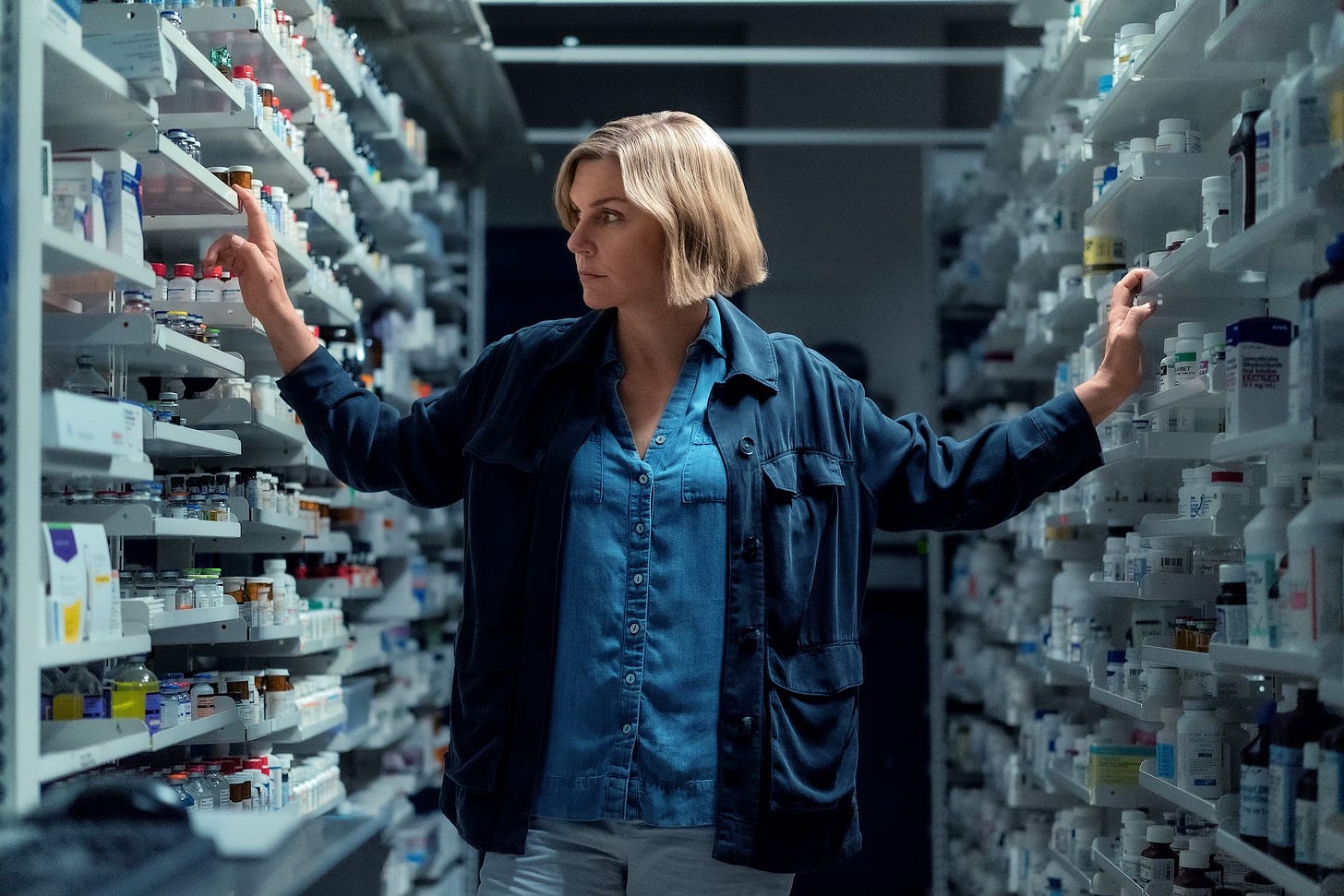Pluribus S1E04 Review | “Please, Carol”
The truth hurts.
[This review contains spoilers for Pluribus Season 1, Episode 4, “Please, Carol”]
Vince Gilligan is quite good at prologues, and “Please, Carol”, the fourth episode of Pluribus, gave us a nice little curveball as we both left and returned to our story, seeing the call from last week’s episode from the perspective of its recipient, Manousos Oviedo (Carlos-Manuel Vesga) The visuals do the talking here as we see how Manousos is managing the hive-mind from his location. His approach bears a striking resemblance to Carol’s. While the independents we met in the second episode seemed moderately indifferent towards the world-shaking events, Manousos is like Carol—bristling at any assistance the hive offers. When they bring him food, he smashes it, refusing to even come out behind the gate of the self-storage facility where he works and preferring to eat from old cans of dog food. That’s the kind of stubbornness that Carol would appreciate.
We then leave Manousos for the remainder of the episode as Carol gets back to doing one of the things she does best, which is problem-solving. She breaks out her whiteboard, where she typically plots her novels and sets to work trying to understand the functions and limitations of the hive mind. She wonders if the hive has the capacity to lie and decides to test the theory with one who was called “Larry” (Jeff Hiller in a welcome guest role). She asks what people thought of her novels, and it’s like trying to break down walls with someone who would prefer to be pleasant than honest, as if the entire world has adopted the attitude of a publicist.
However, during their conversation, Carol makes two important discoveries. The first is that while her books did mean a great deal to some of the people on Earth, when it comes to Helen, she considered the books “cotton candy.” Despite being Carol’s manager and romantic partner, she never considered the books to be great literature. Carol, while a bit defensive, doesn’t seem too shocked by this answer, as it’s likely something Carol believes about her own work. What’s more surprising is that Helen thought Carol’s unpublished novel, the one she encouraged Carol to publish before the hive took over, was “meh.” Helen didn’t even finish reading it (only got to page 137 and then read the last two pages), but thought that publishing it would at least make Carol happy—another example of Helen trying to bring joy to Carol, only to feel frustrated that Carol would prefer to dwell on the negative.
The other major discovery is that the hive can’t lie. They will dodge, obfuscate, and sugarcoat, but ultimately, they tell the truth. This gives Carol the idea that if she can get the truth out of Zosia, then perhaps there’s an answer on how to undo the hive’s takeover. But to get that truth, Carol needs to steal some sodium thiopental (aka truth serum) and get it into Zosia’s IV drip. And before even doing that, Carol has to make sure that sodium thiopental will really work. So she steals some from the hospital pharmacy and sets to work.
In a scene that gives new meaning to the phrase “being honest with yourself,” Carol takes a dose of sodium thiopental (after lying to the hive about wanting heroin just so she could get the syringes) and videotapes herself. When she awakens hours later, she discovers that it not only works, but works so well that Carol ended up confessing things she wasn’t even fully ready to admit to herself, like how much pain she’s in over losing Helen or that she finds Zosia to be “highly fuckable.” Seehorn has been the reliable anchor for the entire series, and scenes like this, where Carol is both tripping and then reacting to her own trip, show why she’s such an incredible performer. As strong and sharp as the writing and direction have been, there’s no question that Seehorn is as vital to this show as Bryan Cranston was to Breaking Bad.
Knowing that the sodium thiopental is the real deal, Carol makes her way back to the hospital to administer a dose to Zosia. However, where the truth eventually came out in the conversation with Larry and Carol’s own trip, getting Zosia to reveal how to undo the hive mind yields disastrous results. Like asking a computer to divide by zero, Carol is asking the hive a self-destructive question, but the paradox can’t be answered. The hive must be honest with Carol and “make her happy,” but such a confession would endanger the hive itself. Can a hive mind self-sacrifice in such a way? Helen lied about Carol’s novel to protect Carol’s feelings. Lies are sometimes a way to bring people happiness, but what happens when truth collides with self-preservation or other directives?
In the case of the hive, they all start sharing Zosia’s immense pain, crying and repeating, “Please, Carol.” It’s a haunting scene where it’s not even Carol’s emotional outburst that is causing the hive to suffer (and given what we’ve seen in previous episodes, we can reasonably assume that the entire world is now weeping and saying, “Please, Carol.”). While the hive has never been openly malevolent, it’s another reminder of how dangerous they are and the lengths they’ll go to for self-preservation, even if they won’t resort to violence.
The episode hammers home the difficulties in making another person happy when the price is the truth. In the case of Manousos at the start of the episode, he refuses all entreaties to his comfort, preferring to eat dog food instead. While Carol isn’t quite as rigid (she does allow the hive to stock a grocery store and clean up damage from the grenade), her story shows the limitations of the truth when happiness is what matters. Carol didn’t love her romance novels, but she understood how much they meant to people, and isn’t that a way to make people happy? Weren’t Helen’s secrets a way to make Carol happy? Wouldn’t it have made Carol’s mom happy to have her gay daughter “convert” to heterosexuality, even though the camp was a hellish experience for Carol? Admittedly, these are varying degrees of pleasant fictions, but ultimately, truth be damned.
It would be nice if we could always reconcile truth and bliss, but we can’t, and so it’s no surprise when the hive has a bit of a meltdown trying to have it both ways when Carol wants the truth about defeating them. Carol thought she had outwitted the hive, but instead, she sees that her current path is only to create more suffering because that might be the only way to get at the truth. And on the other side of that truth might be the world that was, one awash in suffering and lies.
Stray observations:
“You’re the fucking mayor.” It’s a fun moment (featuring Albuquerque’s real mayor, Tim Keller) that reminds us how all hierarchies and distinctions have been erased.
I’m not a bestselling author, but I really need to up my whiteboard game. Keeping it behind wooden panels? I love it. A nice touch for a home office.
I really loved the inclusion of the conversion therapy camp in Carol’s backstory. The hive is aiming for unanimity, and what will be left after such a transformation? For Carol’s mom, she craved unanimity of only heterosexual love. The hive would probably prefer no love at all beyond the bland, anodyne, “I’d like to buy the world a Coke,” kind of love.
“Unfortunately, this hospital does not stock heroin.”
Pluribus airs on Fridays on AppleTV. Matt Goldberg is a critic who lives and works in Atlanta. If you enjoyed this review, check out his newsletter, Commentary Track.


